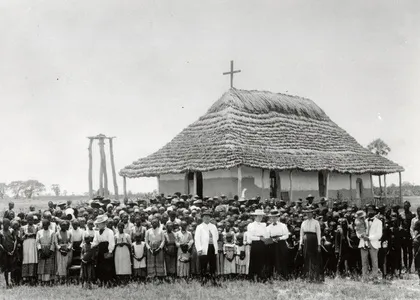By Horatius Bonar
Let us look for a little at the men God has used as instruments in times of spiritual awakenings. Let us note
their character and contemplate their success. They were men of like passions as we are, yet how
marvelously blest in their labors! Whence, then, came their vast success? What manner of men were they?
What weapons did they employ?
They Were in Earnest about the Great Work of the Ministry on Which They Had Entered
They felt their infinite responsibility as stewards of the mysteries of God, and shepherds appointed by the
Chief Shepherd to gather in and watch over souls. They lived and labored and preached like men on whose
lips the immortality of thousands hung. Everything they did and spoke bore the stamp of earnestness, and
proclaimed to all with whom they came into contact that the matters about which they had been sent to speak
were of infinite importance, admitting of no indifference, no postponement even for a day. Yet their fervor was
not that of excitement; it was the steadfast but tranquil purpose of men who felt the urgency and weight of the
cause entrusted to them, and who knew that necessity was laid upon them, yea, woe was unto them if they
preached not the Gospel. They felt that, as ministers of the Gospel they dared not act otherwise; they dared
not throw less than their whole soul into the conflict; they dared not take their ease or fold their arms; they
dared not be indifferent to the issue when professing to lead on the hosts of the living God against the armies
of the prince of darkness.
They Were Bent upon Success
It was with a good hope of success that they first undertook the awful office of the ministry, and to despair
of this would have been shameful distrust of Him who had sent them forth, while to be indifferent to it would
have been to prove themselves nothing short of traitors to Him and to His cause. As warriors, they set their
hearts on victory, and fought with the believing anticipation of triumph, under the guidance of such a Captain
as their head. As shepherds, they could not sit idle on the mountainside in the sunshine, or the breeze, or the
tempest, heedless of their straying, perishing, bleating flock. They watched, gathered, guarded, fed the
sheep committed to their care.
They Were Men of Faith
Men God has used in revival ploughed and sowed in hope. They might sometimes go forth weeping,
bearing precious seed, yet these were the tears of sorrow and compassion, not of despair; they knew that in
due season they would reap if they fainted not, that their labor in the Lord would not be in vain, and that ere
long they would return bringing their sheaves with them. They had confidence in the God whose they were
and whom they served, knowing that He would not send them on this warfare on their own charges. They
had confidence in the Savior whose commission they bore, and on whose errands they were gone forth.
They had confidence in the promises of glorious success with which He had armed and comforted them.
They had confidence in the Holy Spirit’s almighty power and grace, as the glorifier of Christ, the testifier of
His work, and the quickener of dead souls. They had confidence in the Word, the Gospel, the message of
reconciliation which they proclaimed, knowing that it could not return void to Him who sent it forth.
Thus they went forth in faith and confidence, anticipating victory, defying enemies, despising obstacles,
and counting not their lives dear unto them that they “might finish [their] course with joy, and the ministry,
which [they had] received of the Lord Jesus” (Acts 20:24).
They Were Men of Labor
They were required to bear the burden and heat of the day. It might be truly said of them that “they
scorned delights and lived laborious days.” Their lives are the annals of incessant, unwearied toil of body and
soul: time, strength, substance, health, all they were and possessed, they freely offered to the Lord, keeping
back nothing, grudging nothing, joyfully, thankfully, surrendering all to Him who loved them and washed them
from their sins in His own blood – regretting only this that they had so little, so very little to give up for Him
who for their sakes had freely given Himself!
They knew by experience something of what the apostle testifies concerning himself to the Corinthian
church. They knew what it was to be “in weariness and painfulness, in watchings often, in hunger and thirst,
in fastings often, in cold and nakedness” (2 Cor. 11:27). They had no time for levity, or sloth, or pleasure, or
idle companionship. They rose before dawn to commence their labors, and the shades of evening found
them, though wearied and fainting, still toiling on. They labored for eternity, and as men who knew that time
was short and the day of recompense at hand.
They Were Men of Patience
They were not discouraged, though they had to labor long without seeing all the fruit they desired. They
continued still to sow. Day after day they pursued what, to the eye of the world, appeared a thankless and
fruitless round of toil. They were not soon weary in well-doing, remembering the example of the husbandman
in regard to his perishable harvest: “Behold, the husbandman waiteth for the precious fruit of the earth, and
hath long patience for it, until he receive the early and latter rain” (Jas. 5:7).
They Were Men of Boldness and Determination
Adversaries might contend and oppose, timid friends might hesitate, but they pressed forward, in nothing
terrified by difficulty or opposition. Timidity shuts many a door of usefulness, and loses many a precious
opportunity; it wins no friends, while it strengthens every enemy.
Even natural courage and resolution will accomplish much; how much more, courage created and upheld
by faith and prayer. In regard, for instance, to the dense masses of ungodliness and profligacy in our large
towns, what will ever be effected, if we timidly shrink back, or slothfully fold our hands, because the array is
so terrific, and the apparent probabilities of success so slender? Let us be prepared to give battle, though it
should be one against ten thousand, and who shall calculate the issues?
We need strength from above to be faithful in these days of trouble, and rebuke, and blasphemy – to set
our faces like flint alike against the censure and applause of the multitude, and to dare to be singular for
righteousness’ sake, and to fight, single-handed, the battles of the faith.
The sneer, the scoff, the contemptuous smile of superiority, the cold support, the cordial opposition, the
timid friendship, the bold hostility, in private and public, from lips of companions, or neighbors, or fellow
citizens – often under pretext of reverence for religion – these are fitted to daunt the mind of common nerve.
To meet these, nothing less than divine grace is needed. Never, perhaps in any age has wickedness
assumed a bolder front and attitude. Ministers and Christians require more than ever to be “strong and of a
good courage” (Josh. 1:9), to be “steadfast, unmovable, always abounding in the work of the Lord” (1 Cor.
15:58). This has ever been one of the great secrets of success. Them that honor God, God has never failed
to honor and bless.
They Were Men of Prayer
It is true that they labored much, visited much, studied much, but they also prayed much. In this they
abounded. They were much alone with God, replenishing their own souls out of the living fountain that out of
them might flow to their people rivers of living water.
In our day there is doubtless among many a grievous mistake upon this point. Some who are really
seeking to feed the flock, and to save souls, are led to exhaust their energies upon external duties and
labors, overlooking the absolute necessity of enriching, ripening, filling, elevating their own souls by prayer
and fasting. On this account there is much time wasted and labor thrown away. A single word, coming fresh
from lips that have been kindled into heavenly warmth, by near fellowship with God, will avail more than a
thousand others.
Did Christ’s faithful ministers act more on this principle, they would soon learn what an increased
fruitfulness and power are thereby imparted to all their labors. Were more of each Saturday spent in
fellowship with God, in solemn intercession for the people, in humiliation for sin, and supplication for the
outpouring of the Spirit – our Sabbaths would be far more blest, our sermons would be far more successful,
our faces would shine as did the face of Moses, a more solemn awe and reverence would be over all our
assemblies, and there would be fewer complaints of laboring in vain, or spending strength for nought. What
might be lost in elaborate composition, or critical exactness of style or argument, would be far more than
compensated for by the “double portion of the Spirit” we might then expect to receive. (See Second Kings
2:9.)
They Were Men Whose Doctrines Were of the Most Decided Kind, Both as Respects Law and Gospel
There is a breadth and power about their preaching – a glow and energy about their words and thoughts,
that makes us feel that they were men of might. Their trumpet gave no feeble or uncertain sound, either to
saint or sinner, either to the church or the world. They lifted up their voices, and spared not. There was no
flinching, no flattering, or prophesying of smooth things.
Their preaching seems to have been of the most masculine and fearless kind, falling on the audience with
tremendous power. It was not vehement, it was not fierce, it was not noisy; it was far too solemn to be such;
it was massive, weighty, cutting, piercing, sharper than a two-edged sword. The weapons wielded by them
were well-tempered, well-furbished, sharp and keen. Nor were they wielded by a feeble or unpracticed arm.
These warriors did not fight with the scabbard instead of the blade. Nor did they smite with the flat instead of
the edge of the sword. Nor did they spare any effort, either of strength or skill, which might carry home the
thrust of the stroke to the very vitals.
Hence so many fell wounded under them, such as in the case of the celebrated Thomas Shepard of
Cambridge, regarding whom it is said, that “he scarce ever preached a sermon but some or other of his
congregation were struck with great distress, and cried out in agony, ‘What shall I do to be saved?’” Or take
the following account of the effects produced by a sermon of Jonathan Edwards at Enfield in July 1741:
“While the people in the neighboring towns were in great distress for their souls, the inhabitants of that
town were very secure, loose and vain. A lecture had been appointed at Enfield; and the neighboring people
the night before were so affected at the thoughtlessness of the inhabitants, and in such fears that God would,
in His righteous judgment, pass them by, while the divine showers were falling all around them, as to be
prostrate before Him a considerable part of it, supplicating mercy for their souls.
“When the appointed time for the lecture came, a number of the neighboring ministers attended, and some
from a distance. When they went into the meeting house, the appearance of the assembly was thoughtless
and vain. The people hardly conducted themselves with common decency.
“Jonathan Edwards preached. His plain unpretending manner, both in language and delivery, and his
established reputation for holiness and knowledge of the truth, forbade the suspicion that any trick of oratory
would be used to mislead his hearers. He began in the clear, careful, demonstrative style of a teacher,
solicitous for the result of his effort, and anxious that every step of his argument should be clearly and fully
understood.
“His text was Deuteronomy 32:35, ‘Their foot shall slide in due time.’ As he advanced in unfolding the
meaning of the text, the most careful logic brought him and his hearers to conclusions, which the most
tremendous imagery could but inadequately express. His most terrific descriptions of the doom and danger of
the impenitent only enabled them to apprehend more clearly the truths which he had compelled them to
believe.
“The effect was as might have been expected. Trumbull informs us, that ‘before the assembly was ended,
the assembly appeared deeply impressed and bowed with an awful conviction of their sin and danger. There
was such a breathing of distress and weeping that the preacher was obliged to speak to the people and
desire silence, that he might be heard. This was the beginning of the same great and prevailing concern in
that place, with which the colony in general was visited.’”
They Were Men of Deep Spirituality
Their lives and their lips accorded with each other. Their daily walk furnished the best attestation and
illustration of the truth they preached. They were always ministers of Christ, wherever they were to be found
or seen. No frivolity, no flippancy, no worldly humor or companionships neutralized their public preaching, or
marred the work they were seeking to accomplish.
The world could not point to them as being but slightly dissimilar from itself, or as men who, though faithful
in the pulpit, forgot throughout the week their character, their office, their errand. Luther once remarked,
regarding a beloved and much admired friend, “He lives what we preach.” So it was with these muchhonored men of revival.
– Excerpted from True Revivals And The Men God Uses by Horatius Bonar.













